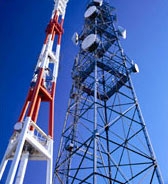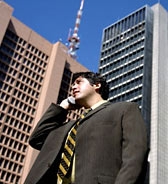
Unison Site Management is in the unique position of discovering a new form of equity that has not yet been tapped into by the majority of financiers and mortgage aficionados. They are creating a specific niche within the realm of the "pooled risk" financial portfolio as we know it. By acquiring cell phone antenna site lease contracts from mainly independent landlords in major cities across the United States, they are banking on the majority of these leases not being terminated by the big wireless companies anytime soon, and coming out way ahead.
Way back when, in the dark ages, as cellular phones were just emerging as the new staple of instant communication, telecommunications companies like Verizon and AT&T set up their wireless divisions and began to rapidly purchase their own cell sites, as capital was cheap and tower companies (or wireless companies) did not require quite as much antenna coverage in order to compete for your business. As the use of cellular phones boomed, so did competition among companies offering wireless communications, and in order for each company to gain more market share they needed to build a greater infrastructure. Wireless companies began to see the value in utilizing the rooftops of commercially owned and strategically placed real estate, nationwide. Landlords had never before realized the financial benefits of renting out their rooftops in exchange for monthly payments of "found money" from cell phone companies who were looking to expand antenna coverage for their existing customers and to acquire new business.
Cellular telecommunications companies will approach a landlord in an area where they feel they will benefit from having coverage, and offer a leasing agreement to that landlord, whereby they will agree to pay that landlord a monthly fee or "rent" in exchange for putting an antenna on that landlord's building. Unfortunately, many landlords feel these leasing agreements are biased with the full advantage being that of the wireless telecommunications company.
These contracts will often state that although the contract works in a block of five years with an option to renew for another five years, this stringent time commitment is only on the part of the landlord, not the wireless company. Typical language in one of these cell site leasing agreements reads that although it is a five year contract, the cellular company can terminate their commitment to the landlord either for technical reasons or just on ninety days notice. Landlords generally agree to this arrangement simply because it is added monthly income that does not require any work.
Unison Site Management is the culmination of the career of Unison CEO, Dewey Shea. Shea accrued his financial prowess while working at Morgan Stanley, bringing public well known fashion houses, Donna Karen and Tommy Hilfiger, during his tenor with the investment banking firm. He learned the ins and outs of creating and maintaining wealth, based on the principal of pooled risk and a diversified portfolio. It occurred to Shea to apply these principals to the exploding wireless communications industry.

Unison's concept is simple: They want to buy out your existing cell site contract and take it over, banking on the hope that the wireless company who initiated the contract keeps renting your cell site for many years to come. In exchange, they will buy you out in one up front payment, the equivalent of up to seven years of monthly payments that you would have received from the wireless company, thereby allowing you to accumulate a substantial lump sum of cash and wash your hands of any concerns of loosing that revenue in the near future.
Unison is hoping that by acquiring and accumulating hundreds and thousands of these contracts, many of them will continue to reap profits for many years, and while some will inevitably be terminated by the wireless companies, many will not. To date, they have invested one hundred million dollars in acquisitions, literally putting their money where their mouth is! According to Unison Marketing Director Mitch Kogen, "We are bundling up receivables, like acquiring mortgages, to create a security based on a number of telecommunications leases."
Kogen joined the company in 2004, and is responsible for their gross revenue doubling since that time. According to Kogen and Shea, "other companies who have tried to enter this realm of finance have not succeeded because they didn't understand the tax complexities of making these transactions, which eventually left no competition." Mitch Kogen welcomes some healthy competition because he feels that "competition creates consumer awareness."
Unison Site Management has grown to a nationwide operation, having acquired cell site contracts in the New York tri-state area, Washington D.C., Pennsylvania, Maryland, Florida, Georgia, Illinois, Ohio, Texas and California. Mitch notes that the amount of rent a cell site lessor will receive often depends upon how densely populated their area is. This will, therefore, result in the amount landlords will receive from their buyout agreement with Unison. A cell antenna site in a largely populated area like New York or Los Angeles can garner as much as $2,500.00 to $3500.00 per month, while landlords in smaller cities like Atlanta or Cleveland would get anywhere from $900.00 to $1200.00 per month in rent, and subsequently in a buyout from Unison. Multiply any of those monthly figures times twelve months and then again times seven years and you can see why many landlords are agreeing to be bought out by Unison Site Management. Why collect monthly rent when you can collect seven years worth of cell site rent in one lump sum and invest that capital in your future. Many landlords will turn around and use that money to invest in more real estate.
Mitch Kogen is quick to add that landlords don't always sell because of the threat of the money going away. The 1031 Starker Exchange Law allows the monies they receive when they sell out to Unison to be re-invested, tax deferred. Right now many landlords are taking advantage of capital and jumping on the Unison bandwagon to be bought out, before interest rates inevitably rise.
For more information on how you can profit with Unison Site
Management, visit www.unisonsite.com. Consultants in major cities, in
forty states nationwide, are available to meet with you in person. Unison
Site Management has their corporate headquarters at 330 Madison Ave, 15th
floor, New York, NY 10017.
